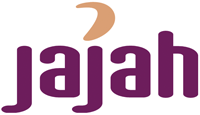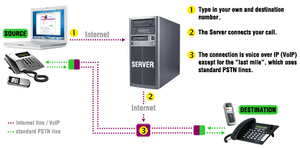Jajah
Jajah was a VoIP (Voice over IP) provider, founded by Austrians Roman Scharf and Daniel Mattes in 2005. The Jajah headquarters was located in Mountain View, CA, USA, and Luxembourg. Jajah maintained a development centre in Israel. On 23 December 2009, it was announced that Jajah had been bought by Telefónica through its subsidiary Telefónica Europe.[1] In December 2013, Telefónica announced that Jajah would shut down at the end of January 2014.[2]
 | |
| Developer(s) | JAJAH Inc. |
|---|---|
| Final release | 1.1 (build 1718)
/ March 14, 2007 |
| Operating system | Cross-platform |
| Type | VoIP |
| Website | none |
Jajah's primary service, Jajah Web, took an approach called web-activated telephony, using VoIP to connect traditional phones (landline or mobile). Calls were made without download or user-installed software, and in most cases at rates lower than those of traditional phone companies or even free of charge.[3]
The company's competitors included Ribbit[4] and IntelePeer.[5]
History
Jajah was founded in 2005 by Roman Scharf and Daniel Mattes. The first beta version of the Jajah Webphone, a proprietary peer-to-peer internet telephony (VoIP) softphone, was released in July 2005. Jajah Web version 1.0 (build 1708) released February 8, 2006. Jajah Web version 1.1 (build 1714) including conference calls was released September 12, 2006. On September 27, 2007, Jajah launches a solution named "Jajah Buttons" which enables small businesses or individuals to embed buttons on their Web sites to allow others to contact them by phone using the company's Internet telephony platform. Jajah Buttons caused a notable controversy when eBay removed and banned such buttons from auction listings in eBay's site, presumably to protect revenues from its own VOIP solution provided by Skype.[6][7] On November 19, 2007, Jajah launched the Jajah Direct service, which enables users to make phone calls without having to be next to a computer.[8][9] Jajah Direct is a phone service that allows you to make long-distance or international calls by calling a local number, it works with every phone.[8][9] There are no free calls using this service.[9] On April 28, 2008 Jajah provideds its proprietary telephony infrastructure, payment processing, and customer care to Yahoo! Messenger users using the platform for receiving calls from the PSTN network, or for making calls to land lines and mobile phones. Telefónica bought Jajah for a reported $207 million on December 23, 2009.[10]
On April 14, 2011, Jajah announced a partnership with Globe Telecom to allow Filipinos living outside Philippines to call home at inexpensive rate.[11] It announced November 30, 2012 that effective January 30, 2013, Yahoo! Messenger will no longer offer Yahoo! Voice Phone In and Phone Out capabilities, the co-branded landline and mobile phone service from Jajah.[12]
On January 31, 2014, Jajah will no longer offer any Jajah.com or Jajah Direct services to its users in the United States or elsewhere.[2]
Jajah Web
Jajah Web connected existing traditional landline or mobile phones with calls that are set up via Jajah's Web site. Jajah claimed that their service worked with any standard web browser.[13]
Jajah Direct
Jajah Direct assigned local numbers to international contacts.
Jajah Free Global Calling
Jajah launched a service offering free calls globally on June 27, 2006.[14] The service is limited to specified geographic areas, and Jajah has also adopted a fair use policy which limits the amount of free Jajah calls.
Calls between registered Jajah users were free of charge for landline and mobile calls within the US, Canada, China, Singapore, Hong Kong, Thailand and apply also for landline calls to and within most European countries as well as Argentina, Australia, Israel, Japan, Malaysia, Mexico City, New Zealand, Venezuela and Zambia.
A limitation is that scheduled calls and conference calls cannot be free. In addition, Jajah's FAQ pages said that Jajah asks its customers to pay from time to time (every six weeks).[15] If the user chose not to pay, Jajah would start charging as it would for a normal call. The lowest amount that could be credited to a user account (every six weeks, to retain the free minutes) was $10.
Facebook Calling

In April 2011, Jajah introduced a VoIP application for Android phones that can be used with Facebook contacts.[16]
References
- MacInnes, Judy; Robert Hetz; David Holmes (December 23, 2009). "Telefonica buys Internet phone provider Jajah". Reuters. Retrieved 23 December 2009.
- Telefonica to Shut Down VoIP provider Jajah on January 31, 2014
- JAJAH Rates Archived January 6, 2010, at the Wayback Machine
- Matt Marshall, VentureBeat. “IntelePeer raises $18M for telephony-Web platform.” November 11, 2008. Retrieved July 10, 2009.
- Om Malik, New York Times. “Why IntelePeer Snagged $18 Million in Funding.” November 11, 2008. Retrieved July 13, 2009.
- Perez, Juan Carlos (October 6, 2007). "VoIP Vendor Jajah Protests eBay's Ban". PC World. Retrieved 2008-09-18.
- Rosmarin, Rachel (October 4, 2007). "Don't Call Me, We'll Call You". Forbes. Archived from the original on August 28, 2008. Retrieved 2008-09-18.
- Kristen Nicole, Mashable. "Jajah Direct. No Internet Connection Necessary.." November 18, 2007. Retrieved January 23, 2012.
- TMCNet. "Jajah Direct Launches." November 18, 2007. Retrieved January 23, 2012.
- NICK CLAYTON, The Wall Street Journal. "Goodbye to the Credit Card Reader." July 27, 2011. Retrieved Aug 9, 2011.
- Carolyn J Dawson, TMC Net. "Globe Telecom and JAJAH Form Partnership." Apr 15, 2011. Retrieved Aug 9, 2011.
- Yahoo Messenger Archived January 19, 2013, at the Wayback Machine
- "Jajah General FAQ". Jajah. Archived from the original on 22 January 2010. Retrieved 16 January 2010.
- JAJAH Introduces Free Global Landline and Mobile Calls Archived July 19, 2011, at the Wayback Machine
- JAJAH Fair Use Policy Archived February 17, 2007, at the Wayback Machine
- Jason Kincaid, Techcrunch. "Jajah Brings Its Facebook Calling To Android, iPhone Coming Soon." April 12, 2011. Retrieved April 12, 2011.